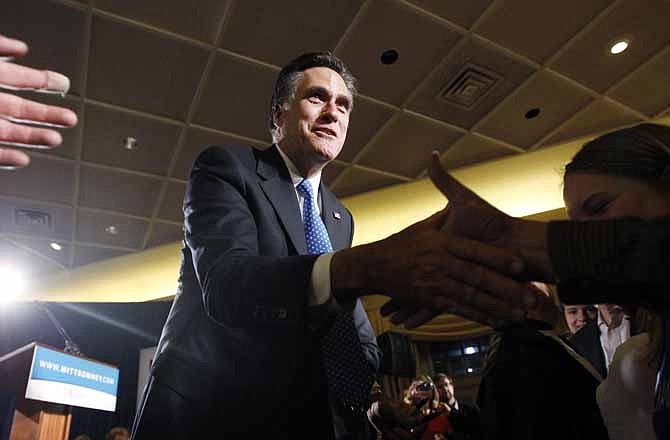WASHINGTON (AP) - Mitt Romney's whisker-thin Iowa caucus victory was underwhelming in scope and anti-climactic in its finality. But it moves him closer to the Republican presidential nomination chiefly because of who finished fourth and fifth.
The former Massachusetts governor will gladly tout his win over Rick Santorum, who could have reversed the results with one more carload of supporters. More important to Romney, however, was the thumping suffered by former House speaker Newt Gingrich and Texas Gov. Rick Perry.
GOP strategists had seen them as having the best backgrounds to sustain a long-term threat to Romney, who remains unable to push his support beyond one-quarter of Republican voters. Now it's unclear whether Perry and Gingrich can maintain viable campaigns.
Romney's closest competitors in Iowa were Santorum, practically an afterthought as little as two weeks ago, and libertarian-leaning Rep. Ron Paul of Texas.
Santorum now must show whether he can build on his remarkable Iowa sprint to become the long-sought conservative alternative to Romney. It won't be easy.
Santorum, 53, badly lost his 2006 bid for a third Senate term from Pennsylvania. He has modest fundraising and ground-game operations, and he's largely unknown beyond circles that closely follow politics.
Paul, 76, is seen more as a libertarian crusader than a potential president. He recently said he doesn't envision himself as president.
"Romney did what he had to do, but not much more," said GOP strategist Terry Holt.
On the upside, Romney can argue that he not only won Iowa, but he beat expectations. He said from the start that Iowa was a bad political fit for him, and he focused his early campaign efforts on New Hampshire. He made a big Iowa push at the end, when it was clear that no rival had consolidated the anti-Romney vote.
He now heads to the friendly turf of New Hampshire, where he owns a home. The state's primary is next Tuesday.
But it's also easy to paint Romney's Iowa finish as unimpressive. He drew one-fourth of the vote. That's precisely the lackluster level he has pulled month after month, in poll after poll of Republicans.
It's also the same percentage Romney got when he finished a deeply disappointing second in the 2008 Iowa caucus. Campaign veterans say Romney must find a way to excite more conservatives if he is to beat President Barack Obama in November.
"If Romney was unable to move the needle even an inch from four years ago," despite heavy spending on his behalf, "it is hard to argue he has brought new people in or expanded the base of support," said former Obama campaign and White House aide Jen Psaki.
Some Republican consultants, however, see the glass as half full for Romney.
"Romney is in the driver's seat in New Hampshire," said Terry Nelson, who advised Tim Pawlenty before he left the presidential race. "Iowa produced no serious candidate to derail him."
Nelson said it "will be very hard" for Santorum to raise the money and build the organization he will need to compete in New Hampshire, South Carolina, Florida and beyond.
Democrats were less impressed. Matt Bennett of the group Third Way called it a mixed bag for Romney. Santorum and Paul, he said, are "the two demonstrably least-electable candidates in this field since Donald Trump fired himself."
But Romney's inability to build a big plurality is a problem, Bennett said. "Challengers to incumbent presidents cannot get merely polite applause or grudging support from their own base if they hope to win general elections," he said.
Nonetheless, Romney is poised to do something no Republican has done in recent times: follow a contested Iowa caucus victory with a primary win in New Hampshire. New Hampshire voters have shown contrarian streaks before. But a Romney loss there would rank as a huge upset.
Even if he carries New Hampshire, Romney won't be home free. His Mormonism could hurt him in South Carolina, whose primary is Jan. 21. But with Perry and Gingrich wounded, it's unclear who can take full advantage.
Romney might be able to endure a poor finish in South Carolina and move on strongly to Florida, which votes on Jan. 31. It's a sprawling, diverse and expensive state for candidates. Romney has proven to be the best fundraiser, organizer and strategist thus far.
Democrats were hoping for a slow and difficult start for Romney. They want to see him battered, and bled of money, for as long as possible before the summer nominating conventions.
Iowa's results leave both parties with plenty of disappointments.
__
EDITOR'S NOTE - Charles Babington covers national politics for The Associated Press.


